TikTok star Taylor Price on why she started helping younger generations to manage their money and best tips for financial freedom.
A new survey by Bank of America finds that nearly half of adult members of Gen Z are relying on financial help from their parents and family members to get by.
The survey for Bank of America’s Better Money Habits team found that 46% of Gen Z are receiving financial assistance from their parents or other family members, a figure that declines to 30% for Gen Z non-students.
Holly O’Neill, president of retail banking at Bank of America, told reporters on Tuesday that, “Gen Zs are coming out and becoming independent, so I think if I were to want to see progress in a category, that would be… Gen Z becoming more independent from family and friends.”
“Maybe I’m biased because I have three Gen Zs I’m trying to make independent, but I think that’s a marker that they’re setting a budget and they’re living up to that budget, so that’s an area I’d like to see some progress on,” O’Neill said.
CREDIT CARD DELINQUENCIES ARE SURGING – AND RISING FASTEST IN THIS CALIFORNIA CITY
More than half of Gen Z respondents said they’re receiving financial assistance when account for parents and family as well as friends and the government. (Photo by: HUM Images/Universal Images Group via Getty Images / Getty Images)
Aside from the 46% of Gen Z receiving financial support from parents, a further 3% said they’re getting help from friends while 9% said they’re receiving funds from the government, meaning that 54% of Gen Z are receiving some form of financial assistance.
Of those who received financial assistance, 32% get $1,000 a month or more while 44% are getting less than $500 per month. Non-student Gen Z respondents received smaller sums, as just 22% said they’re receiving more than $1,000 a month and 55% said they receive less than $500 per month.
Gen Z members who receive financial assistance said that they use the money to help pay for things like groceries and toiletries (57%), rent and utilities (53%), phone plans (53%) and health insurance payments (49%).
YOUNGER GENERATIONS OPEN TO TURNING TO FRIENDS, FAMILY TO ACHIEVE HOMEOWNERSHIP

Bank of America’s survey found that nearly half of Gen Z are getting financial help from their parents and family. (Smith Collection/Gado/Getty Images / Getty Images)
The survey also found that more than half of Gen Z, 52%, don’t make enough money to live the life they want because of the high cost of living. To deal with rising expenses, 43% of Gen Z reported cutting back on dining out, 27% passed up events with friends, 24% switched to more affordable grocery stores and 21% started using a budget.
Over half of Gen Z, 54%, said they don’t pay for their housing. Of the 46% who do, 64% reported that more than 30% of their monthly paycheck goes toward housing while 23% said 51% or more of their paycheck goes to housing costs.
A 57% majority of Gen Z respondents said they don’t have enough emergency savings to cover three months of savings – consistent with Bank of America’s findings of 56% in 2023 and 55% in 2022.
GEN Z LEAN ON CREDIT MORE THAN MILLENNIALS DID AND RACKING UP MORE DEBT

Over half of Gen Z respondents said they’re not paying for their housing, according to the survey. (Joy Addison/Fox News / Fox News)
“They are also delaying some what we would think are traditional markers of financial advancement,” O’Neill said. “So 50% say they’re not on track to buy a home in the next five years, 46% say they won’t be able to save for retirement and 40% said they’re not on track to start investing.”
“Some of this is to be expected, these Gen Zs are age 18 to 27, so think about that age – if you’re 18, obviously in five years, buying a home could be a stretch,” O’Neill said. “But they’re taking active management of their financial life, they’re delaying some of this stuff until they’re ready.”
Newsfromrss.com
In terms of what actions that members of Gen Z looking to improve their financial situation should take, O’Neill offered three key steps to take.
“As we talk about putting yourself on a path to financial health, these are three of those critical milestones – managing our day-to-day expenses; getting and sticking to a budget; and then building and managing your credit,” O’Neill said.


